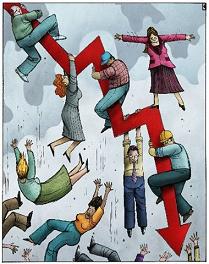A “Fix” to the Economic Recession: Undermine the Rights of Public Sector Workers

In the state of Oregon, the most widely distributed paper, the Oregonian, announced on its front page that the state should expect “Ten Years of Pain.” The perpetrator: the budget crisis — $2.5 billion in the coming two-year budget cycle, with $2 billion projected deficits until 2019. Sadly, these depressing numbers assume that the economy will recover, a belief lacking any credible evidence.
How to fix Oregon’s woes? The Oregonian answers:
“…[Governor] Kulongoski is calling for a statewide conversation to determine how best to shrink what state government provides while leaving its core functions and duties intact… Among the options being discussed are requiring state workers to pay some of their health care premiums or requiring public employees to contribute to their retirement pensions [the 401(k) model] ” (May 21, 2010).
Some politicians are more blunt about their feelings for state workers, demanding that they accept wage cuts as well.
This kind of “fix” for the recession isn’t limited to Oregon; it’s a national issue — promoted by the corporate-friendly media and corporate-awestruck politicians. The pensions of public workers are being especially targeted, labeled by the media as “lavish” and “elite.” The New York Times quotes Girard Miller of Governing Magazine:
“The pension crisis in New York state parallels others such as those in Illinois and California that also require serious solutions…many states must fix their pension laws to enable public employers to install lower-cost benefits for future service by incumbents and new employees.” (May 20, 2010).
Translation: Newly hired public employee should have lower wages and benefits. This is the same “two-tiered” system that the automotive corporations used to boost their profits off the backs of their employees.
The most popular method to attack public workers is to make the now-infamous switch from the pension plan to the 401(k), which most American workers know to be a giant scam. Creating a second tier of workers and switching to a 401(k)-type of “pension” are the two most mentioned ideas emanating from the U.S. corporate-elite.
Public workers are being painted as scapegoats for the recession that was triggered by the Wall Street super-rich, who are working hard to shift the nation’s rage away from themselves, towards public workers— especially unionized public workers— immigrants, and other groups of working-class people. It’s classic divide and conquer politics; pitting one section of workers against another, with the hope that the corporations and rich — who dominate both the economy and government — will be ignored.
Europe’s corporate-elite are using the same strategy. A separate New York Times article discussed the Europe-wide budget crises, announcing that the culprit is…public workers. A student is quoted as saying: “They [public workers] sit there for years drinking coffee and chatting on the telephone and then retire at 50 with nice fat pensions.”
The European response?
“Greece has frozen [public worker] pensions for three years and drafted a bill to raise the legal retirement age to 65. Greece froze public-sector pay and trimmed benefits for state employees, including a two-month- salary bonus. Portugal has cut 5 percent from the salaries of senior public employees and politicians and increased taxes, while canceling big projects; Spain is cutting civil service salaries by 5 percent and freezing pay in 2011 while also chopping public projects.” (May 22, 2010).
The budget crisis phenomenon is international, and the international corporate-elite are sharing ideas on how best to come out of the crisis unscathed. They’re blaming the recession itself on public employees, on “greedy” workers who earn the tiniest fraction of what rich shareholders make by doing nothing.
All public workers must unite to combat this assault, while reaching out to private sector workers as well, since all workers deserve the ability to retire comfortably. Retirement itself is becoming an endangered species. Also, all workers will be negatively affected by the multitude of regressive “consumption taxes” being proposed by business groups: alcohol, cigarettes, sales taxes, etc.
Alternative solutions to fix the crisis must be demanded, most notably raising taxes significantly on the rich and corporations. Either workers will pay for the crisis, or the corporate-elite will. If unions and community groups do not raise their voices with this demand, the decision will be made for us, at our tremendous expense.
Shamus Cooke is a social service worker, trade unionist, and writer for Workers Action (www.workerscompass.org). He can be reached at [email protected]

